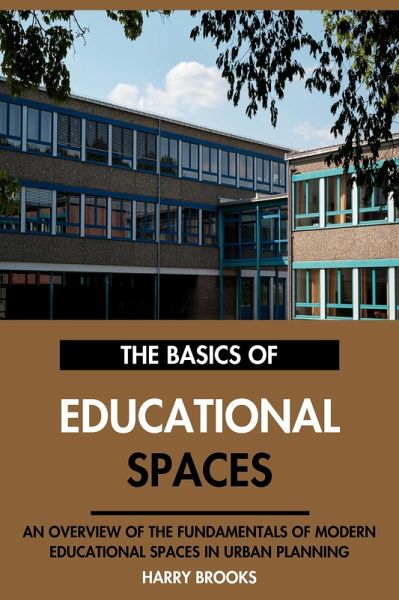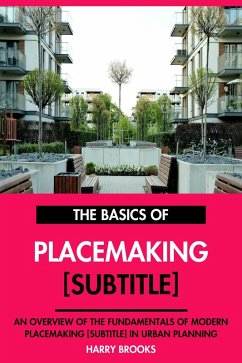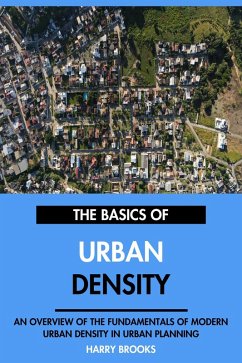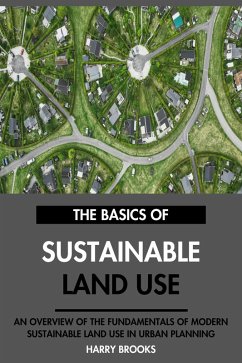
The Basics of Modern Educational Spaces: An Overview of the Fundamentals of Educational Spaces in Urban Planning. (eBook, ePUB)

PAYBACK Punkte
0 °P sammeln!
The landscape of education is undergoing a profound transformation, driven by the changing needs of society and the rapid advancement of technology. As we navigate this evolution, the concept of educational spaces has emerged as a critical area of focus for educators, urban planners, and policymakers alike. This eBook aims to explore the multifaceted nature of educational spaces, particularly in the context of urban planning, and to highlight their significance in shaping the future of learning.Educational spaces are more than just physical locations where teaching and learning occur; they are...
The landscape of education is undergoing a profound transformation, driven by the changing needs of society and the rapid advancement of technology. As we navigate this evolution, the concept of educational spaces has emerged as a critical area of focus for educators, urban planners, and policymakers alike. This eBook aims to explore the multifaceted nature of educational spaces, particularly in the context of urban planning, and to highlight their significance in shaping the future of learning.
Educational spaces are more than just physical locations where teaching and learning occur; they are dynamic environments that influence the educational experience. The design and functionality of these spaces can significantly impact student engagement, academic performance, and overall well-being. In urban settings, where diverse populations and complex challenges intersect, the need for innovative and inclusive educational spaces is more pressing than ever.
This eBook will delve into various aspects of educational spaces, examining their role in fostering collaboration, creativity, and community engagement. We will explore the fundamentals of modern educational spaces, the importance of inclusivity and accessibility, the integration of technology, and the impact of design on student outcomes. Each chapter will provide a comprehensive overview of these topics, drawing on research, case studies, and best practices from around the world.
As we embark on this journey, it is essential to recognize that the future of education is not solely about the content being taught but also about the environments in which that learning takes place. The design of educational spaces must reflect the values and needs of the communities they serve, creating environments that are welcoming, safe, and conducive to learning. By prioritizing these elements, we can create educational spaces that empower students and educators alike, fostering a culture of lifelong learning and innovation.
This eBook is intended for educators, urban planners, policymakers, and anyone interested in the intersection of education and the built environment. It is our hope that the insights and perspectives shared within these pages will inspire new ideas and approaches to creating educational spaces that truly support the needs of learners in the 21st century. Together, we can envision and build a future where educational spaces are not only places of learning but also vibrant community hubs that enrich the lives of all who engage with them.
Educational spaces are more than just physical locations where teaching and learning occur; they are dynamic environments that influence the educational experience. The design and functionality of these spaces can significantly impact student engagement, academic performance, and overall well-being. In urban settings, where diverse populations and complex challenges intersect, the need for innovative and inclusive educational spaces is more pressing than ever.
This eBook will delve into various aspects of educational spaces, examining their role in fostering collaboration, creativity, and community engagement. We will explore the fundamentals of modern educational spaces, the importance of inclusivity and accessibility, the integration of technology, and the impact of design on student outcomes. Each chapter will provide a comprehensive overview of these topics, drawing on research, case studies, and best practices from around the world.
As we embark on this journey, it is essential to recognize that the future of education is not solely about the content being taught but also about the environments in which that learning takes place. The design of educational spaces must reflect the values and needs of the communities they serve, creating environments that are welcoming, safe, and conducive to learning. By prioritizing these elements, we can create educational spaces that empower students and educators alike, fostering a culture of lifelong learning and innovation.
This eBook is intended for educators, urban planners, policymakers, and anyone interested in the intersection of education and the built environment. It is our hope that the insights and perspectives shared within these pages will inspire new ideas and approaches to creating educational spaces that truly support the needs of learners in the 21st century. Together, we can envision and build a future where educational spaces are not only places of learning but also vibrant community hubs that enrich the lives of all who engage with them.
Dieser Download kann aus rechtlichen Gründen nur mit Rechnungsadresse in A, B, CY, CZ, D, DK, EW, E, FIN, F, GR, H, IRL, I, LT, L, LR, M, NL, PL, P, R, S, SLO, SK ausgeliefert werden.













